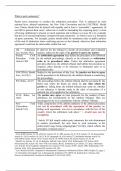What is party autonomy?
Parties have autonomy to conduct the arbitration procedure. This is endorsed by most
national laws, arbitral institutions, the New York Convention and the UNCITRAL Model
Law. Parties should also be treated with equality and at least a ‘reasonable’ 1 opportunity (if
not full) to present their cases2, otherwise it could be misleading the conjuring party’s vision
of having entitlement to present as much argument and evidence as it sees fit. Lew contends
that this is of second importance compared to party autonomy3, in which it acts as a limitation
on party autonomy. For example, parties should abide by mandatory rules or public policies
of the seat of arbitration when conferring powers on the tribunal, otherwise their arbitration
agreement would not be enforceable within that seat.
UK Arbitration
It shall be for the tribunal to decide all procedural and evidential
Act, Section 34(1) matters, subject to the right of the parties to agree any matter.
French Civil
An arbitration agreement may define the procedure to be followed
Procedure Code,in the arbitral proceedings, directly or by reference to arbitration
Article 1509 rules or to procedural rules. Unless the arbitration agreement
provides otherwise, the arbitral tribunal shall define the procedure as
required, either directly or by reference to arbitration rules or to
procedural rules.
UNCITRAL Model Subject to the provisions of this Law, the parties are free to agree
Law, Art 19(1) on the procedure to be followed by the arbitral tribunal in conducting
the proceedings.
ICC Rules, Art 19 The proceedings before the arbitral tribunal shall be governed by the
Rules and, where the Rules are silent, by any rules which the
parties or, failing them, the arbitral tribunal may settle on, whether
or not reference is thereby made to the rules of procedure of a
national law to be applied to the arbitration.
LCIA Rules, Art The parties may agree on joint proposals for the conduct of their
14(2) arbitration for consideration by the Arbitral Tribunal. They are
encouraged to do so in consultation with the Arbitral Tribunal…
New York “[t]he composition of the arbitral authority or the arbitral procedure
Convention, was not in accordance with the agreement of the parties, or,
Article V(1) failing such agreement, was not in accordance with the law of the
country where the arbitration took place.” > Award may not be
recognised.
‘Article V(1)(d) simply makes party autonomy the sole determinant
in matters procedural, the only limit to such autonomy at the
enforcement stage being subparagraph [V(1)(b)], which reflects the
principles of natural justice’4.
1
AAA ICDR Articles 19, 20; CIETAC Articles 38, 41; DIS sections 26, 27; ICC Articles 15, 20; Korea Rules
Article 41; LCIA Articles 14, 20-22; ICAC paragraph 34; NAI Article 27; Stockholm Institute Article 26;
UNCITRAL Rules Article 24-25; Vienna Article 14; WIPO Article 48; Zurich Articles 35, 43, 44.
2
Model Law Articles 18, 34, 36; Belgium, Judicial Code Article 1694; Netherlands, CCP Article 1039;
Switzerland, PIL Article 182; New York Convention; Brazil, Arbitration Law Article 21; China, Arbitration
Law Articles 43-47; England, Arbitration Act sections 33-34; France, NCPC Article 1460; Netherlands, CCP
Articles 1036, 1039; Switzerland, PIL Articles 182, 184.
3
Lew, Mistelis & Kröll, Comparative International Commercial Arbitration (Kluwer 2003) Chapter 22, page 2.
4
G. Petrochilos, Procedural Law in International Arbitration 355 (2004). M. Kurkela & S. Turunen, Due
Process in International Commercial Arbitration 25-28 (2d ed. 2010).




